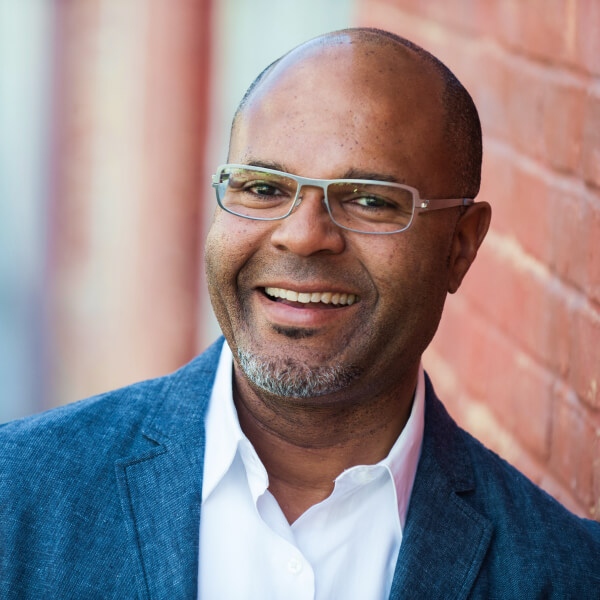Say the word “improv” and most people conjure up images of Whose Line is it Anyway?, Chicago’s Second City, or other comedy shows. While many enjoy the art form as an audience member, the thought of doing improv gives them chills!
This was certainly my response when I first encountered improv. I was shocked when a very shy friend of mine shared that he had just taken a course. However, I was also intrigued and plied him for more details. As he described his experience, he was elated and full of an energy I’d never seen in him before. He was lit up and a fuller version of himself, more alive and more confident. I was won over and signed up for a class immediately, a five-day improvisation intensive.
The first day of the workshop brought me back to my first days at school as a young boy. I was overcome with nervousness, used the bathroom at least five times, and almost walked out during the introduction! I was terrified and all I could imagine was feeling like a fool and completely embarrassing myself. But I plucked up my courage and stayed.
Within the first hour of our class I was hooked. My nervousness quickly transformed into fascination. We immediately engaged in exercises that were simple on the surface, but allowed us to open up, relate to each other, and develop quick but meaningful bonds. It turned out we were all nervous, but eager to step into this new territory together. What lay ahead suddenly became less daunting.
Over the course of those five days we learned the practices of improvisation first hand. The through-line was a few basic principles, described well by Robert Poynton in his book Everything’s an Offer:
- Letting go of our plans, assumptions, inhibitions, and fear of judgment from others
- Noticing more, intentionally stepping out of autopilot and paying greater attention to our surroundings
- Everything is an offer. Recognizing that everything we notice around us, and everything that happens to us is a potential offer we can use to grow and learn and expand our potential
With every exercise we did, these principles came to life. Along with “yes, and” they are the foundation of the improv you see on stage or TV, but they also apply beautifully to almost every aspect of life. Any time life takes you by surprise and you have to respond quickly and in the moment by drawing upon your innate wisdom, that is improvisation at work.
Improvisation as a Relational Practice
Of the many the things we learned, what has stayed with me are the initial exercises we did to get to know each other. Those connection exercises were powerfully effective and helped us build relationships that elevated our learning. Jane Dutton, a professor at the Ross School of Business at the University of Michigan, reminds us that, like in this improv class, “organizations depend on individuals to interact and form connections to accomplish the work of the organization. The quality of connections, in turn, affects how organizations function.” It is relatively easy to make connections in work and life, but it is the quality of those connections that influences the quality of outcomes.
Life in organizations is organized around task and relationship, yet we spend much of our time and energy focused on the first of these practices – task. Companies that devote equal attention to relationship have been shown to produce higher business results. Anything that helps create those bonds is investing in the organization’s “relational reserves.” The financial reserve is what an organization carries to provide a budgetary cushion during an economic downturn or market hardship. Similarly, a relationship reserve equally provides a bank of built-up trust, hope and other virtues that equally support an organization during tough times. The higher quality those relationships are, the healthier your reserves are.
Connection and relationships are the bedrock of organizations; without them organizations are handicapped in their ability to thrive and succeed. Improv is a unique way to build these ties – it is a relational practice.
Improv at Work
Improvisation has become a core part of my practice as an organization leader and practitioner. One playground for my practice is the University of Michigan’s Center for Positive Organizations, in the Ross School of Business. Each year, I teach improv to a class of undergraduate and graduate business school students. The class is part of a six-week intensive called Magnify, focused on the practices of positive organizations. My session is at the beginning of Magnify and I capture this moment as an opportunity to use improv to build connection and relationships.
Over the course of the three-hour session, we playfully and skillfully move from acquaintance to high-quality connection, using improvisation to build trust and safety. I have seen each group’s energy transform from reserved and hesitant to open, joyful, and alive. It is magical! By the end of each class a real team and community has been formed — the group has built up a significant relational reserve that amplifies commitment and learning during the intense demands of the following six weeks.
One student in a recent class described his experience in this way. “I had taken classes and workshops where the importance of play was elaborated and implemented heavily. We would play countless types of games, but the social skills they facilitated were not salient. During our time (with Chris), every activity was purposeful. Each game or group exercise had the excitement of play in its natural form, but pushed us to utilize deeper team skills. Taking directions, communication, and fast thinking are a few of the many vital social and career tools called upon, all disguised in a seamless fun package.” Sean Dew, University of Michigan, Magnify Student
This experience at the University of Michigan reminds me of my own introduction to improvisation many years ago. Through its invitation to play, improvisation reliably breaks down barriers and supports a relational engagement that is powerful and lasting. This kind of connection is a building block of positive workplace culture, and from such a foundation so much more becomes possible for individuals and organizations.
Life will always throw us some curveballs. I invite you to practice the principles of improvisation to embrace the unknown in the new year and see the change it can bring to your work and life.
Photo by Lyndsey Marie on Unsplash











